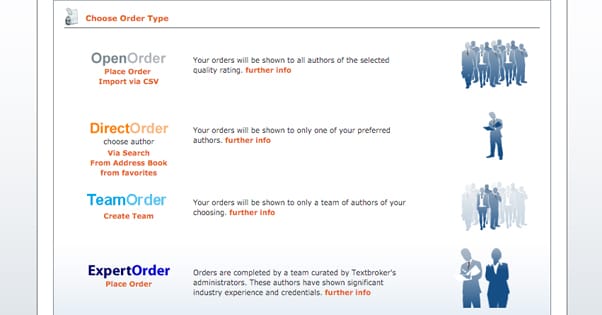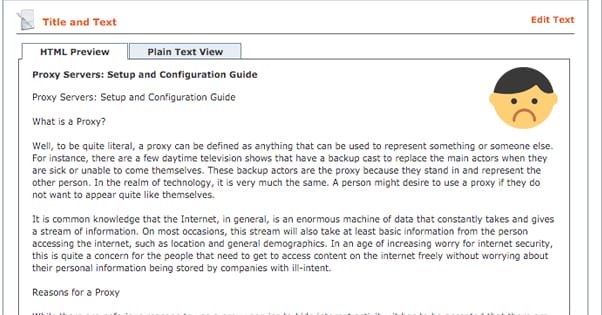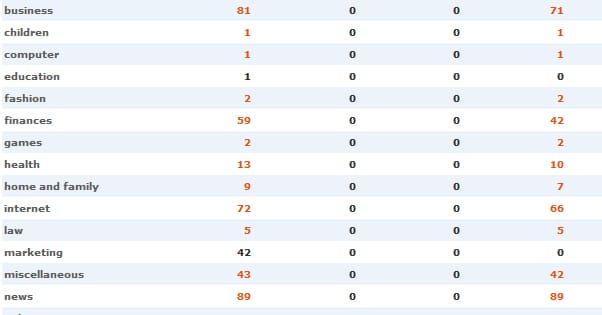A Comprehensive Review on Textbroker and Article Quality
Published by James Parsons • Content Marketing • Posted March 16, 2016 ContentPowered.com
ContentPowered.com
Textbroker is the prototypical content mill marketplace these days, and it’s a hub for middling and low quality content for a pretty cheap price. It has a lot of flaws, and it really only survives because its rates allow it to gather bulk clients for extremely basic content which is, at best, passable. Having experienced it from both the writer and the client side, I can tell you quite a bit about it.
Online Reviews
First of all, there are a ton of reviews out there for Textbroker.com. Just take a look at this page, for example. From looking at it, you would think Textbroker is a scam. Well, there’s a lot of misinformation on this page and others like it.
The misinformation comes from people who don’t read contracts and don’t know what they’re getting into. There are some legitimate complaints in these reviews, which I’ll get to in a moment, but I’d like to correct some of the inaccuracies.
- First of all, the online freelance writing “scam” is not a scam. Thousands of writers are making a living, albeit a minimal one, from sites like Textbroker, Writer Access, Freelancer, or oDesk. Let me ask you; if a client posts an assignment opportunity and a writer can pick it up, write it, submit it, and get paid, how is it a scam? These sites aren’t stealing money, and they aren’t charging writers for access. They take a cut, yes, but every middleman site everywhere in every industry will do that. Textbroker’s pay rates are terrible, but that’s not a scam, it’s just a business catering to the lowest of the low.
- Several of the complaints on this page relate to the initial review period. People complain that they pick up some articles, write them, and then are locked out for weeks while the site reviews them. They claim there’s no warning about this, but that’s just a lie to make them seem the victim. Textbroker very clearly states for new writers that they write 5 articles, at which point they are locked until editors review those articles to give the writer an initial star rating. Anyone who didn’t read this is just an idiot and was going to be victimized by some scam or another sooner or later.
- One gal complains about having to submit a photo ID and a W9 to write for the site. She worries about sharing such personal information. News flash, lady: they’re a business paying you money. They need your tax information to give it to the IRS, so they aren’t audited and fined. If you’re getting paid and not submitting your tax information you are literally committing a felony. It’s not shady, it’s the freaking law!
- One guy as a client says that the company assigns a writer to you. This isn’t true; assignments go into a public pool – or a team pool, or a direct order to a specific writer if you pick that writer to send it to – and any writer can pick it up so long as they have the right star level rating.
- Another guy misinterpreted the terms of service and says that Textbroker owns the copyright on the work produced through the platform. This isn’t technically true, but even if it is, it’s the nature of freelance work. Writers ghostwriting through a site like Textbroker are producing content and selling the rights to that content. They aren’t licensing it, they are selling ownership of it. Likewise, they are not selling it to Textbroker themselves, they are selling it to the clients. This is why writers can’t go and post the content they just sold elsewhere; they sold exclusive rights. This isn’t a problem and just stems from an ignorance about how the content economy works.
Textbroker isn’t a very good company and the work produced by its writers is in general not very good, so there are a lot of valid complaints you can make. You don’t need to make up lies and inaccuracies to smear them; they do it pretty well themselves.
How Textbroker Works
In order to understand all of the legitimate issues with Textbroker, you first need to understand how the site works.
From a client perspective, when you sign up for Textbroker, you’re asked to deposit some initial money. Textbroker holds funds in escrow to avoid clients scamming writers; if you don’t reject an article, you end up paying for it regardless of how satisfactory it was. You can’t take a post and run without paying – at least, not without repercussions. Some clients take posts, ask for revisions, reject those revisions, and keep the post, but that’s a huge asshole move and you shouldn’t do it.
When you create an assignment, you are free to include as much or as little guidelines as possible. I’ve found that writers prefer a reasonable amount of guidance. Some clients link out to Google Doc guidelines and have thousands of words of specifications for 500 word articles, which is frankly insane. These writers are getting paid less than minimum wage and have to work very quickly to make a reasonable living; they aren’t going to spend two hours looking over guidelines for a $7 article.
Additionally, you can specify keywords and keyword density. Keep in mind that these by default are exact match and are required for the writer to submit a post. I’ve seen clients post a 400 word assignment with 10 multi-word “keywords” that were required to be posted 2-3 times each. The client doubtless expected the writer to use 1-2 of those keywords 2-3 times in the post, but due to the way Textbroker works, they would need to use all of them at least twice in order for the post to be submitted.
You have three options of where to post your assignment.
It can go in the open pool, it can go in a team pool, and it can go as a direct order.
- The open pool ranges from 2-star to 5-star. Each is a quality level rating of what you can expect from the writers. It’s also a pay level, with 2-star sitting very cheap and 5-star also pretty cheap but expensive in comparison.
- Teams can be created by you at any time, and have fixed pay rates. They can be open or closed. Open teams can have any writer apply for them based on your criteria, or no criteria at all if you want free access. This allows you to put together a team of writers you prefer to work with, to prevent writers you don’t like from getting access to the posts.
- Direct orders allow you to send an order directly to a specific writer, who is free to accept or reject the assignment. Writers are allowed to set their pay rates, which can be much higher than even the 5-star level, so make sure you know what quality the writer produces before you submit.
There are also managed teams, which involve a Textbroker staff editor managing a team for you and vetting all articles before you even see them. This, however, tends to be limited to large bulk clients. If you have 15,000 product descriptions you need written, a managed team might be available. If you’re commissioning six blog posts per week, probably not. To be part of their managed service, you need a minimum budget for your project of $2,500.
Regardless, when you submit the assignment, it sits in the designated pool until a writer accepts it. Once a writer picks it up, they have a fixed amount of time in which they can write and submit something. When you set a word count, say, 300-400 words, the writer is free to write as much as they like so long as they hit the minimum. They can write 300, but not 299. They can write 700 if they want. Most won’t, because they don’t get paid extra, and you are not charged extra if the writer goes over.
The writer will submit something to you which, very likely, will be kind of trash. If you’re lucky, one of the few good writers on the site will pick up your post, and you’ll get something worth way more than you’re paying. This is rare, though; most good writers bailed from the site and have found more lucrative positions.
When you get your first draft you have 96 hours to either accept the article or request revisions. You cannot reject it on the first draft; this is another writer protection. For writers it’s very welcome; for clients it can be aggravating and set back your timetable if you need revisions.
Revisions have a short window, typically 24 hours for the writer to return them. The second draft then has the reject option if you need to use it. You won’t pay for the post, but the writer might blacklist you. The writer also has the option of rejecting the revision and dropping the assignment, at no penalty to themselves. Some writers do this on any revision request beyond simple typos, because a rejection can hurt them a lot.
If you like the post, accept it and the money will be deducted from your account. If you let the 96 hour window expire, the assignment is automatically accepted and money is deducted.
From a writer’s point of view, clients can be tyrants and the Textbroker staff are a monolithic testament to inefficiency and dictatorship. Writers apply and are accepted at a star level, typically 3 or 4. 5 is not available from the start, not even for professional writers with extensive credentials. They are allowed to write 5 articles, at which point their account is put on hold and their posts are reviewed. Based on the review of these posts, the writer is given a more accurate star rating between 2 and 4.
For a writer, 2 and 3 are death sentences. 2 has no work, ever. Even if it did, it pays pennies per hour. It’s firmly in the realm of Indian Sweatshop. 3 is bad, and arguably worse due to the hope involved. There’s enough work that you might think you can move up, but the inertia of a 3-star rating means it’s incredibly difficult to move up. Worse, the pay rate is terrible.
4 is where the majority of the writers and the majority of the work is. It’s cheap for a client and it’s almost good enough to be tempting to a writer that doesn’t know any better.
In order to get moved up to 5 star, the writer must take a very finicky proofreading test that is 10 multiple choice questions and score above an 80%. Given that each question can have more than one right answer and you must tag them all to get it right, this is very difficult. Add in the fact that it uses both AP style and Textbroker’s stylebook, it becomes nearly impossible. Then, to add insult to injury, writers can only take the test once every three months.
Writers pick up assignments from the public pool and can join open teams, apply to closed teams, or join teams they are invited to join. Once in a team, they can pick up orders from that team as well. They are always open to direct orders and are free to accept or reject them at will.
One thing to note is that while clients can see the screenname of the writers they work with, the writers only see clients as an anonymous number. Textbroker really doesn’t like clients and writers communicating and will actively censor direct messages or assignment/revision requests to remove any information that could be used to communicate with one another outside of the site. This is because if Textbroker clients hired writers directly, the site would lose its income and collapse.
Writers live or die by their star rating, which is a horrible situation because their star rating is only calculated based on their five most recent posts. Textbroker’s editors also only go over assignments in large batches every few months, so a writer might be stuck in one situation despite writing hundreds of posts. Worse, if a writer writes 100 posts at 4-star level but 3 of their 5 most recent are rated 3, they become a 3-star writer.
Legitimate Complaints
There are a lot of issues with Textbroker. A lot.
- The average writer quality is terrible. 2-star posts are barely even English. 3-star are what you might expect from a poorly trained article spinner. 4-star are rarely passable but often crap. 5-star can be decent, but are still more expensive than the actual quality is worth. Only a few writers are worth hiring, and generally they only work via direct orders with significant fees attached.
- Textbroker’s editors review every post… eventually. However, they have a hands-off approach and cannot make even minor changes to the text. They don’t benefit clients or writers; they exist solely to be a dictatorial overwatch from the site looming over writers.
- Speaking of their editors, they are often hired with very little experience and no training. Despite having immense power of peoples’ livelihoods, they can be straight-up wrong and there will be no repercussions.
- The Textbroker cut is not insignificant, so keep in mind what you pay writers is more than what they see. You pay a 4-star writer 2.4 cents per word, but they only receive 1.4. At 5-star, you’re paying 7.2 but they’re only getting 5.
- As a writer, a rejection is insanely damaging. More than one rejection in a short time will more than likely get you fired. As a consequence, most writers will drop revisions and eat the loss of their time than risk getting a rejection.
- The draconic anti-communication censoring puts an atmosphere of oppression over both sides of the relationship. It should be a red flag indicating that there’s a reason the site doesn’t want clients and writers hooking up, and that’s because much better deals can be struck directly.
So, at the end of the day, it looks like this. For writers, Textbroker has a few nice protections to ensure you get paid, but the pay itself is minimal and the framework of the site is very punishing. It’s an oppressive atmosphere of fear rather than support and quality. It encourages minimal-thought fast-produced low-quality content, and that’s exactly what is delivered. It can be a good starting place for a novice writer to pick up some web writing skills, but if you’re working at it for longer than a few months, you’re wasting time and energy.
From the client perspective, it’s pretty much never worth the time or money for blog posts. If you have product descriptions or basic technical writing that doesn’t need to be complex, it’s a cheap way to fill out a site. It’s also decent enough to fill out PBN blogs or spam sites, but it’s not something I would want on my main site. You’re very likely to end up suffering a Panda penalty sooner or later.










Textbroker has changed the rating system. Now, a single article picked at random can determine a writer’s star level. This is even more unfair than the previous method. If someone is demoted from 4 to a 3, they could languish there for months until the rating algorithm chooses one of their articles again.
A small correction: a rejection is not “insanely damaging.” It is true that many writers toss articles back rather than revising because the requests are often ridiculous or a ploy to get free content.
All messages on the site are now moderated, which makes communicating with client next to impossible, especially on weekends when no one is there to review messages and push them through. The writer’s forum is also completely moderated. Replies to threads often take days to show up.
I work mostly with private clients and through Constant Content now. Much better pay, and I’m treated with respect.